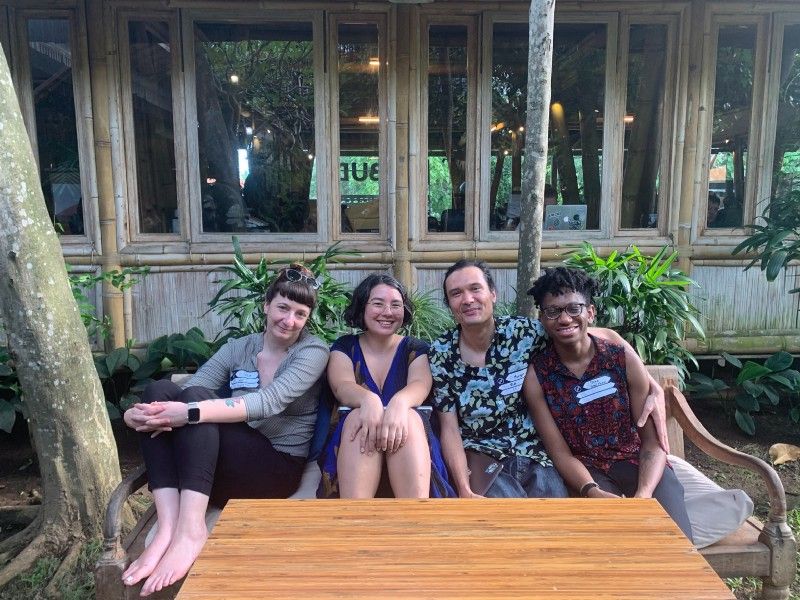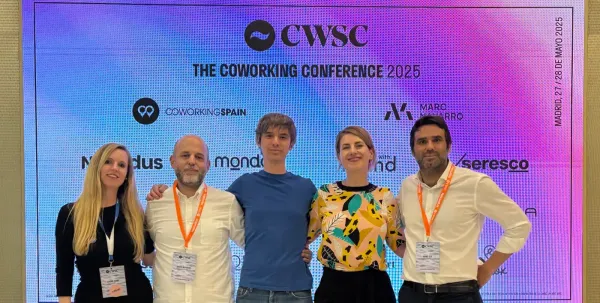Bali, Indonesia might call to mind endless beaches, lush tropical foliage, and fresh local delights — but from 2–7 March it was also the vibrant center of the global coworking world. The Coworking Unconference Asia (also known as CU Asia) continues to be one of our favorite coworking events. And not just because of their incredible destinations, but because of their committment to pushing a coworking narrative that centers the experience of professionals who are invested in the potential and possibilities of linking communities, and ultimately, people.
Note: This event happened just before travel restrictions were imposed on Germany and much of the world, briefly stranding even members of the Cobot team abroad. A lot has changed in the past three weeks. We’re still publishing this out of respect and gratitude for the organizers, speakers, and participants who worked so hard to make this event a reality.
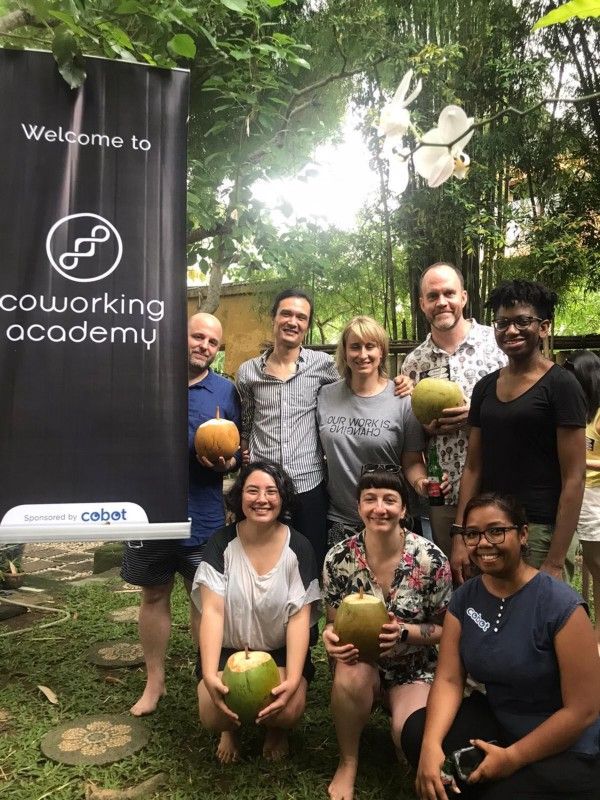
The Coworking Academy
The Coworking Academy kicked off the week by answering the questions you didn’t even know that you had. Coworking expert, frequent contributor, and good friend of the Cobot team Marc Navarro organized and led the entire event alongside Renee Martyna, Co-founder of both Hubud and CU Asia.
A highlight was the talk How to Design a Thrilling Space led by Joana Carvalho. So many coworking spaces were started because of their founders’ need to connect. So what are the keys to facilitate the comfort required for this connection among your members? Start with thermal comfort, acoustic comfort, emotional comfort, indoor air quality, and ergonomy. Think about the ways that you can balance the needs of the different groups that will inhabit the space.
Once the academy wrapped up, we took a short break and headed right back to the main event!
CU Asia
Om Swastiastu!
Greetings! Every year, CU Asia starts with a breakout performance that represents the location in which the event is being held. This year, the organizers kicked off with the sundara, a traditional balinese dance.
The sessions split between how to fulfil the loftier ambitions of coworking, and how to implement the nitty-gritty deatails of space and tech optimization.
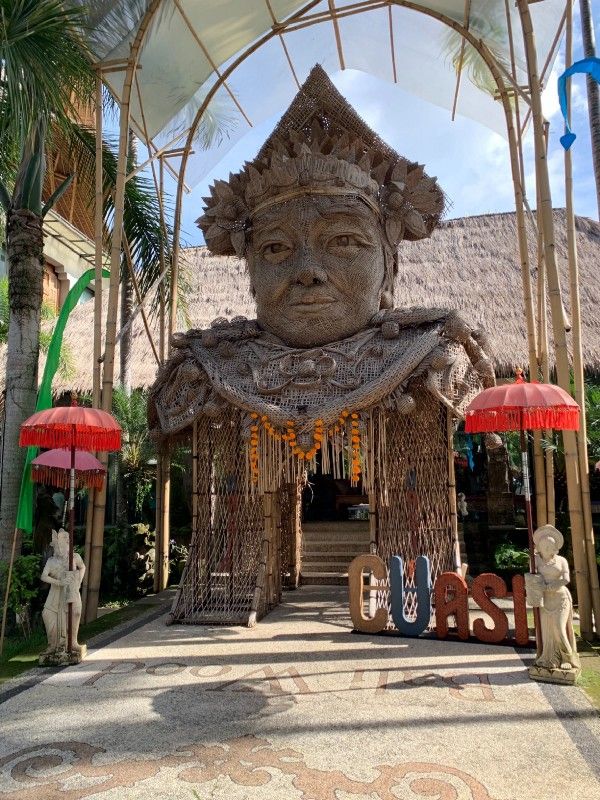
The Community Side
One of our favorite talks was led by one of our favorite voices in the coworking community. Tara Everett, Founder of Canoe Coworking in Manitoba, Canada, presented What Difference Does it Make: Diversity, Inclusion, and What it Brings to the Coworking World.
Tara’s story began with a specific, necessary vision: trying to setup a coworking space in Canada while dealing with the marginalisation, violence and mistrust towards indigenous people — her community and members. The goal was to create a safe space for indigenous people to work without having to deal with daily racism and a place for non-indigenous people to get involved in what she calls a “good way” (for example, by addressing historical reparations), and giving back to the community.
An unconference session called Racism, Exclusion, and the Coronavirus (led by Yeji Cheon) has proven prescient in the three weeks since we listened in and shared our own experiences.
It’s not really “if I’m ok, then I’m ok.”
Who’s likely to suffer most in the case of a coronavirus outbreak? And what will the disease reveal about the way we’ve structured work in the first place? Restaurant and service workers are more likely to be uninsured or under-insured. Immigrants and refugees have fewer resources to deal with long-term instability. And people with disabilities have long asked for more work-from-home accomodation and been told that it was impossible. Lots of things that were impossible last month are suddenly possible. Conversations about the virus took racial overtones from the start and have resulted in more social and economic discrimination.
The coronavirus isn’t creating problems in societies around the world — it’s revealing them. So what do we do?
Be more considerate in your communication and expansive in your views of community. Make it accessible where you might have thought not possible before.
During the panel Respecting the Space: How to Be Sensitive to Local Communities (Kali Norman, Tara Everett, Ashley Proctor), the discussion leaned into the ways that spaces can be a positive impact. Spaces can’t be the ambassadors or provide reconciliation for indigenous people in the country. But they can help their members by establish some changes in their spaces like gender neutral bathrooms and improve the solid structures that keeps communities at the margins.
Our goal should be to empower, facilitate, invite, help fund, give voice to — but not “save,” “solve,” or give a solution.
The Business Side
On a panel with representatives from different coworking software companies, we took a break from discussing our technology to talk about some of the big-picture trends that we were seeing, behind the scenes. Among the observations, we saw that big companies were adopting coworking elements internally, fragmentation in the industry that prevents it from generating good data, and smaller, non-coworking related businesses asking how they can incorporate coworking into their business.
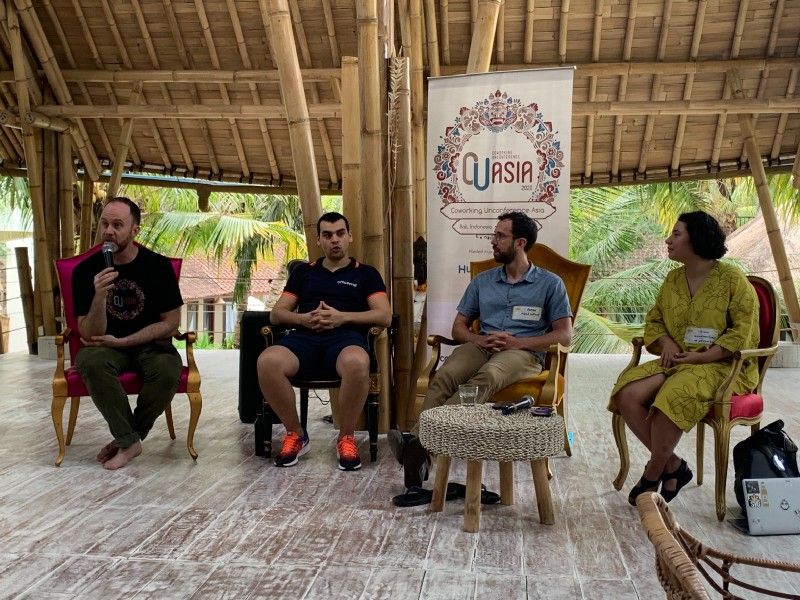
A big shift on the horizon is community-free coworking. In Germany, the largest rail service provider (Deutsche Bahn) is testing coworking as a service for commuters, what will happen when more organizations start to incorporate coworking despite making no attempt at building community?
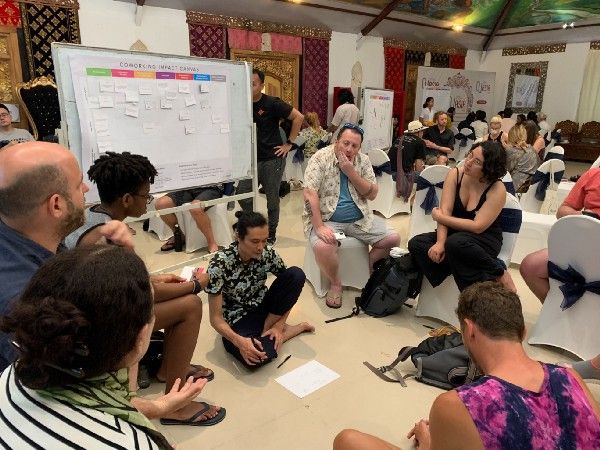
Another panel a member of our team participated in was New & Creative Ways to Hold Space for People: Collectives, Hacker-Labs, Creative Spaces, & Coliving (Morgan Sully, Susan Allen, Ophelie Cutier, Ashley Proctor). Each of the panelists had some experience working with new or unusal modes of human interaction and gave some advice on how they were able to do so. Some of their advice:
- When transitioning from more informal gatherings to profitable spaces it is important to keep in mind the notion of belonging throughout that transition.
- Encourage participation and work to the process of “failure” instead of shutting down ideas, even if you know from experience that some things don’t work.
- Make ownership flexible instead of unconsciously falling into very stiff roles like “the organiser.”
- Reaching out for mentorship that sometimes can be very hands-off, just offering support and have you reflect on what do you need to get things moving.
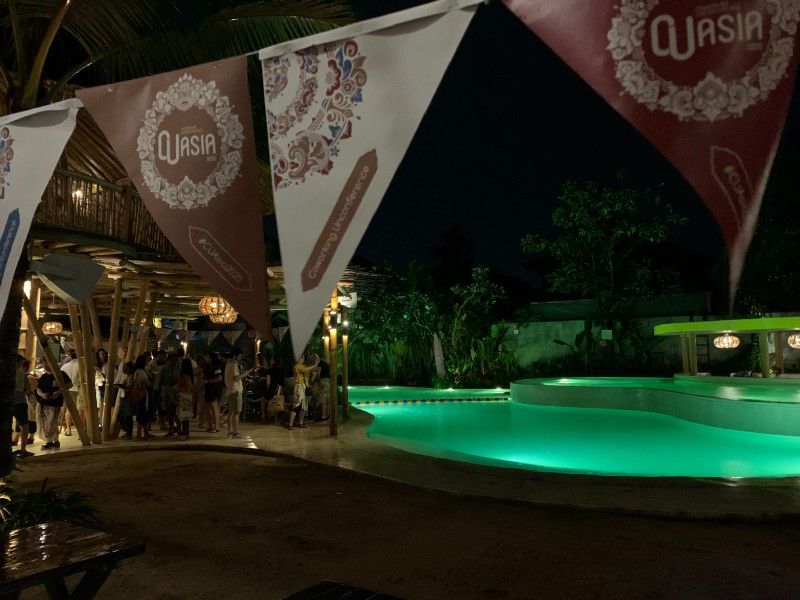
Another successful year!
Thanks to all the organizers who made this event possible. It’s been overshadowed by the coronavirus pandemic but we were glad that we managed to take a few moments of coworking connectedness before we were forced into our homes for this extended period of time. Let’s hope that by next year we’ll be back to talking about the many wonderful ways coworking is being applied to our daily lives again.
If you aren’t already using Cobot as your coworking management software, give it a go! You’ll find that our features can help you run your coworking space more effectively and grow your community. Just sign up for a free trial or a live demo session. And if you have questions, our support team is all ears!
Happy Coworking!
